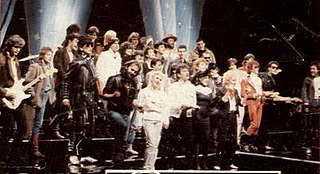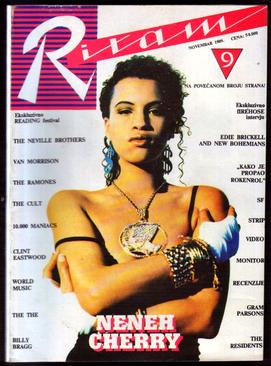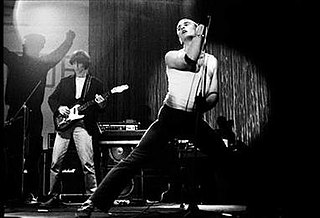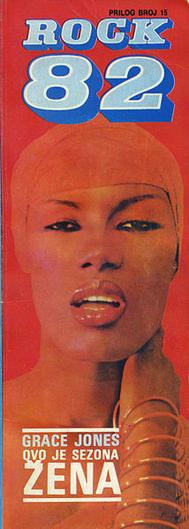
Bajaga i Instruktori are a Serbian and Yugoslav rock band formed in Belgrade in 1984. Founded and led by vocalist, guitarist and principal composer and lyricist Momčilo Bajagić "Bajaga", the group is one of the most notable acts of the Yugoslav rock scene.

Idoli were a Serbian new wave band from Belgrade. They are considered to be one of the most notable acts of the Yugoslav rock scene, and their 1982 album Odbrana i poslednji dani was on several occasions voted by the music critics as the greatest Yugoslav rock album.

Koncert kod Hajdučke česme is the first live album by Yugoslav rock band Bijelo Dugme, released in 1977. The album's title refers to the band's famous concert played on August 28, 1977 near Hajdučka česma grounds at Košutnjak Park in Belgrade. However, the material on the record is only partially recorded at the said event.

Pljuni i zapjevaj moja Jugoslavijo is the eighth studio album by Yugoslav rock band Bijelo Dugme, released in 1986.

YU Rock Misija was the Socialist Federal Republic of Yugoslavia's contribution to Bob Geldof's Band Aid campaign, which culminated with the Live Aid concert. It consisted of recording the "Za milion godina" charity single and staging a concert held at Red Star Stadium in Belgrade on 15 June 1985, both featuring top acts of the Yugoslav rock scene. The proceeds from both the single and the concert were given to Band Aid.

Riblja Čorba is a Serbian and former Yugoslav rock band formed in Belgrade in 1978. The band was one of the most popular and most influential acts of the Yugoslav rock scene.
Miroslav "Vicko" Milatović is a Serbian musician best known as the drummer for the Serbian and Yugoslav rock band Riblja Čorba.

Pub is the first solo album released by Serbian and former Yugoslav singer-songwriter Đorđe Balašević. The album was produced by Josip Boček, who played guitar as well.

Odbrana i poslednji dani is the first studio album by Yugoslav new wave band Idoli released in 1982.

Korni Grupa was a Yugoslav rock band formed in Belgrade in 1968.
Propaganda was a Yugoslav new wave band formed in Belgrade in 1981. Formed by former Zvuk Ulice and Bulevar members, Propaganda released only one album, Apatija javnosti, and disbanded. After the group ended its activity, Propaganda guitarist and vocalist Kokan Popović continued his career with the band Idoli, where he was soon joined by Propaganda bass guitarist Branko Isaković. Despite being short-lived, Propaganda was a prominent act of the Yugoslav new wave scene.

Ritam was a Serbian and Yugoslav popular culture magazine.

Petar i Zli Vuci were a former Yugoslav new wave/ska band from Belgrade, notable as the participant of the Artistička radna akcija project.
The discography of the Serbian rock band Idoli, consists of two studio albums, one EP, five singles and two compilation albums.

Kazimirov kazneni korpus / Profili profili is the first and only studio release by the Serbian minimalist / experimental music bands Profili Profili and Kazimirov Kazneni Korpus, recorded and released in March 1982. This split album, released by Galerija Srecna nova umetnost SKC, is the first former Yugoslav album, released under an independent record label.

Iskre were a Yugoslav rock band formed in Belgrade in 1961. Iskre were one of Yugoslavia's earliest rock bands and are notable for being one of the pioneers of the Yugoslav rock scene.

Doktor Spira i Ljudska Bića were a Serbian new wave/alternative rock band from Belgrade. They were a prominent act of the Yugoslav new wave scene.

Džuboks was a Yugoslav music magazine. Launched in 1966, it was the first magazine in SFR Yugoslavia dedicated predominantly to rock music and the first rock music magazine to be published in a communist country.

Denis & Denis was a Croatian and Yugoslav synth-pop group formed in Rijeka in 1982. Formed as a duo consisting of keyboardist and vocalist Davor Tolja and vocalist Marina Perazić, Denis & Denis immediately gained attention of the Yugoslav audience with their first recordings broadcast on Yugoslav radio stations. Their debut album, Čuvaj se!, released in 1984, brought them nationwide popularity, Perazić becoming one of the biggest sex symbols of the Yugoslav rock scene. Their second album, Ja sam lažljiva, was recorded during Tolja's military leaves from the Yugoslav army, so for the live performances he was replaced by Edi Kraljić, his former bandmate from the band Linija 32. Ja sam lažljiva brought new hits and increased the group's popularity. After Tolja's return from the army, the group continued working as a trio consisting of Tolja, Perazić and Kraljić. After Perazić left the group in 1986 to start a solo career, Tolja and Kraljić continued working as Denis & Denis, turning towards pop rock sound. After the release of the album Budi tu in 1988, the group disbanded, Tolja dedicating himself to work in studio.

Ex YU rock enciklopedija 1960–2006 is a book by Serbian author, journalist and music critic Petar Janjatović. Published in 2007, the book represents the third, expanded edition of Janjatović's 1998 book Ilustrovana YU rock enciklopedija 1960–1997. The book features information about most important acts of the rock scene of Socialist Federal Republic of Yugoslavia, as well as of scenes of the successor states.

















